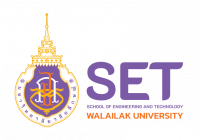On 1 – 5 June 2020, Walailak University Led by Assistant Professor Dr. Nirattisai Rakmak and Mr Kunakorn Phayungphan, Research Assistant, School of Engineering and Technology Along with the working group of the Academic Services Center “Field installation and testing of biogas production system” at the Walailak Phatthana Community, Tha Sala District, Nakhon Si Thammarat Province
Project to develop a prototype for biogas production at the household level with joint fermentation between pig manure and local waste. Under the Social Engagement Project of the Year 2020, the objective is to study the possibility of using pig manure to produce biogas together with waste in the community. Which, if appropriate environmental management will lead to utilization of economic value Or help save household expenses and help to better preserve the environment on the pig farm Which has the project implementation period Since january Until September B.E.2020 Project implementation Entered the area to conduct pig manure and waste survey on the pig farmers farm Assess the possibility of producing biogas from those wastes And assess the readiness of model farmers And design and build a biogas production system at the household level with a joint fermentation between pig manure and local waste (Biogas). Biogas or Biogas are gases obtained from the fermentation of animal waste, food scraps or various sewage caused by digestion. Decompose organic matter by microbes under anaerobic conditions Most gases are methane (CH4) which can be ignited.

In this regard, Assistant Professor Dr. Nirattisai Rakmak School of Engineering and Technology As project leader And the project working group Carried out the activities as follows: 1) Install and test biogas systems, prototype households, consisting of 2 household farms. By focusing on the development and improvement of biogas systems, such as adding necessary equipment. 2) Providing consultation on usage (Fermentation process) and correct maintenance 3) Monitoring and evaluation of the project. The project working team will use the information to evaluate the potential of biogas production (during the month of July) that is consistent with the amount of waste added to the system. To improve the system In accordance with the farm context and the amount of pig manure Along with selecting households that are interested Come to join the training to expand knowledge And develop a prototype house to be a learning center on biogas production in the next steps


Thank you for information from Academic Service Center

